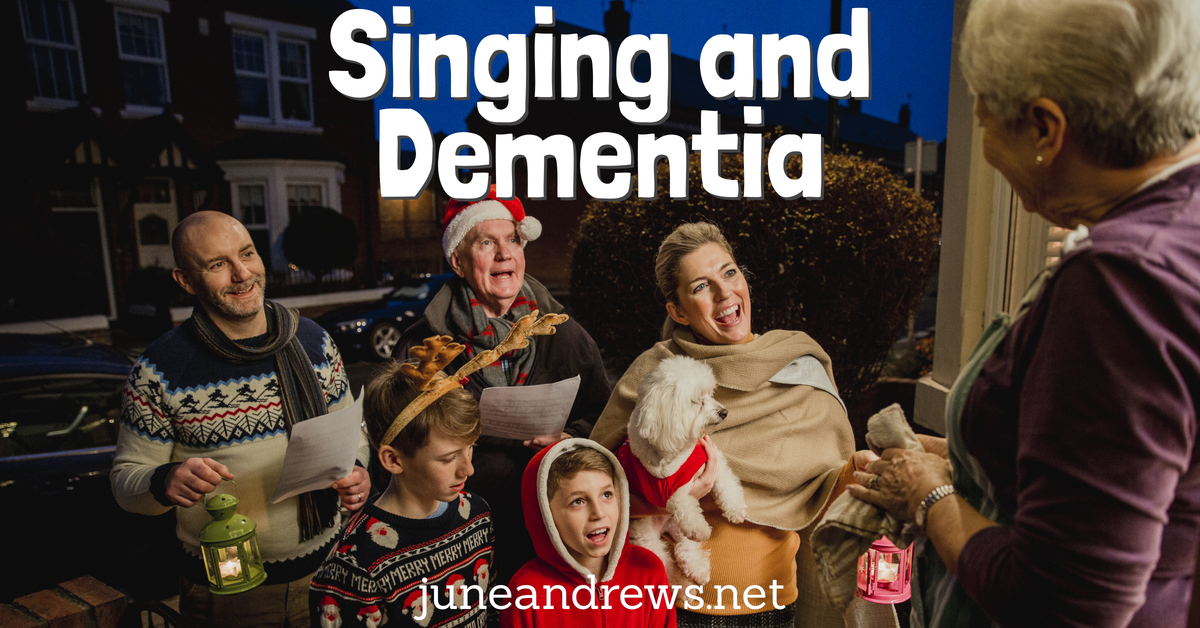Hark the Herald Angels Sing…. and dementia
Dementia choirs are such fun!
The idea that singing reverses dementia is questionable
Singing is good for well being for everyone.
I love to sing and it is a great delight to see people living with dementia who enjoy singing.
In the grey literature, that is, ordinary media and the bulletins of voluntary organisations and care providers, there are often repeated claims that art is a ‘therapy’ for dementia. Unfortunately, these claims are not supported by research. In a Cochrane review, one of the highest standards of evidence in health science, which looked at art as therapy in dementia (Deshmukh, Holmes and Cardno, 2018) the authors explain that arts-based therapies are commonly thought of as ways of dealing with symptoms of dementia. Art as therapy is assumed to slow cognition decline, tackle behavioural symptoms and improve quality of life. On examination of the published reports on the subject, the authors conclude that there is ‘insufficient evidence about the efficacy of art therapy for people with dementia.’ They note that in studies which claim therapeutic outcomes, the quality of evidence is ‘very low.’ This is unfortunate because the claims that are made in support of art as a dementia therapy are so pervasive, and on an emotional level, persuasive. But they are clearly not based on what is normally considered as evidence in health care.
Emotional reaction doesn’t necessarily mean dementia reversal
There is a significant emotional reaction from carers and care workers when people with dementia are discovered to have a better memory for sung lyrics than other verbal memories. The observers feel that the memory has returned or otherwise improved. It feels uncharitable to explain that singing is not reducing the dementia symptom of memory loss but that rather, for this person, songs were not yet lost, though you did not know this till you offered an opportunity. The video (Original) Man in Nursing Home Reacts to Hearing Music from His Era 2019) has been seen over 2.5 million times on the internet, and the emotional commentary implies that an improvement in the man took place as a result of the music. Rather than shedding tears watching him take such huge pleasure in his music, one might be tearful that no one thought of giving him access to his music sooner.
The idea that something is better than nothing appears self-evident, and art activity may be regarded as at least harmless. However, if the ‘something’ is using up resource that could be used more effectively, it is misuse of resources. And not all art activity is harmless. People have to live with the amateur murals that an art project may have put up in a care home, no matter how aesthetically alarming they are. Residents may wonder where the kind people who used to come and sing to them have gone, when the money runs out. The relationship felt personal to them, even if the musician or singer was only “doing a project.”
Art is a human NEED not a dementia therapy
In conclusion, artists should refocus on art as a human need, rather than a dementia “therapy” to avoid a devaluation of the concept of therapy, and the objectification of people with dementia as the stuff of an art project should be as carefully considered as you would if you were trialling them on an unaffordable and unproven new medication. Distracting people with dementia to entertain them is worthy activity, but distracting policy makers with ornamental interventions is not without risk. What I have said here is based on a paper that was commissioned by a serious academic organisation but which they rejected because it passed the test of whether it was evidence based, but they didn’t like what it said. We can’t afford when supporting people affected by dementia spend too much focus on just what is merely likeable.
And so, having delivered my contrarian message, I’m calling on Alexa to get me some Christmas tunes that I and all my friends with dementia can sing along to with gusto, and love, and affection and memories. Because we love to sing and it makes us all feel better.
If you would like more information, you can buy my book Dementia, the One Stop Guide or Care Homes: When, Why and How to Choose a Care Home. I am available for consultancy for families or organisations. And if you have any further queries or questions, or suggestions for something you’d like to see me write on, please contact me via the Contact Page
See my new course on Dementia the One Stop Guide on Policy Hub here
Find out about Carers and Caring: the One-Stop Guide here and preorder NOW

